-
INSTITUTO
-
EVENTOS
-
ASSISES
-
SEMINARIOS
Spotkanie z
Panią Profesor Mélanie Schmitt,
w ramach seminarium pt.:
“Orzecznictwo ETPCz w sprawach socjalnych.
Perspektywa Wschodu i Zachodu”.
Poznań, Collegium Iuridicum, s. 316,
27.05.2024, godz. 16.oo
A w dniu 25 maja, rozmawiamy o:
“Zasadzie subsydiarności w dobie kapitalizmu”.
Gdynia, Domek Żeromskiego, ul. Orłowska 6, godz. 18.00
Anna Musiała
CBZ, 19 maja 2024 r.
* ze względów organizacyjnych, proszę o zgłaszanie chęci uczestnictwa
do dnia 24.05 na adres: musiala@amu.edu.pl

A lo largo del curso académico 023-2024,
el Instituto de Estudios Avanzados continuará con:
1. ¿Seminarios sobre la teoria del Derecho del Trabajo,
2. Encuentros integrantes del ciclo:
“Cómo llamar al mundo en el que vivimos?”.
Asimismo se realizaran otros eventos inspirados en lecturas actuales.
CBZ, el 22 de julio 2023.
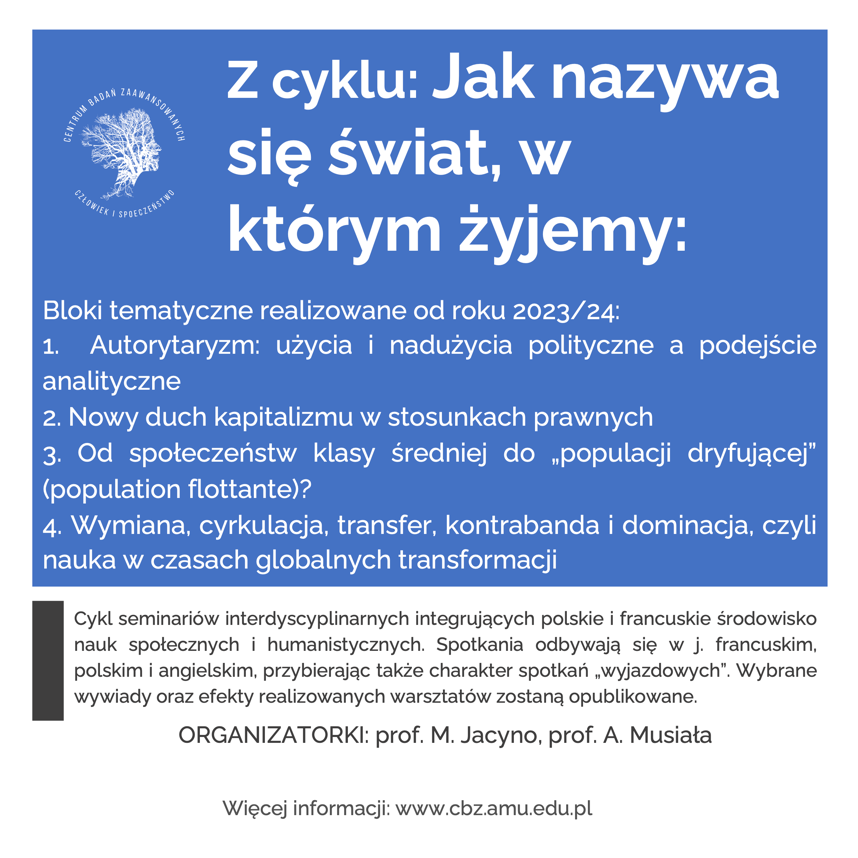
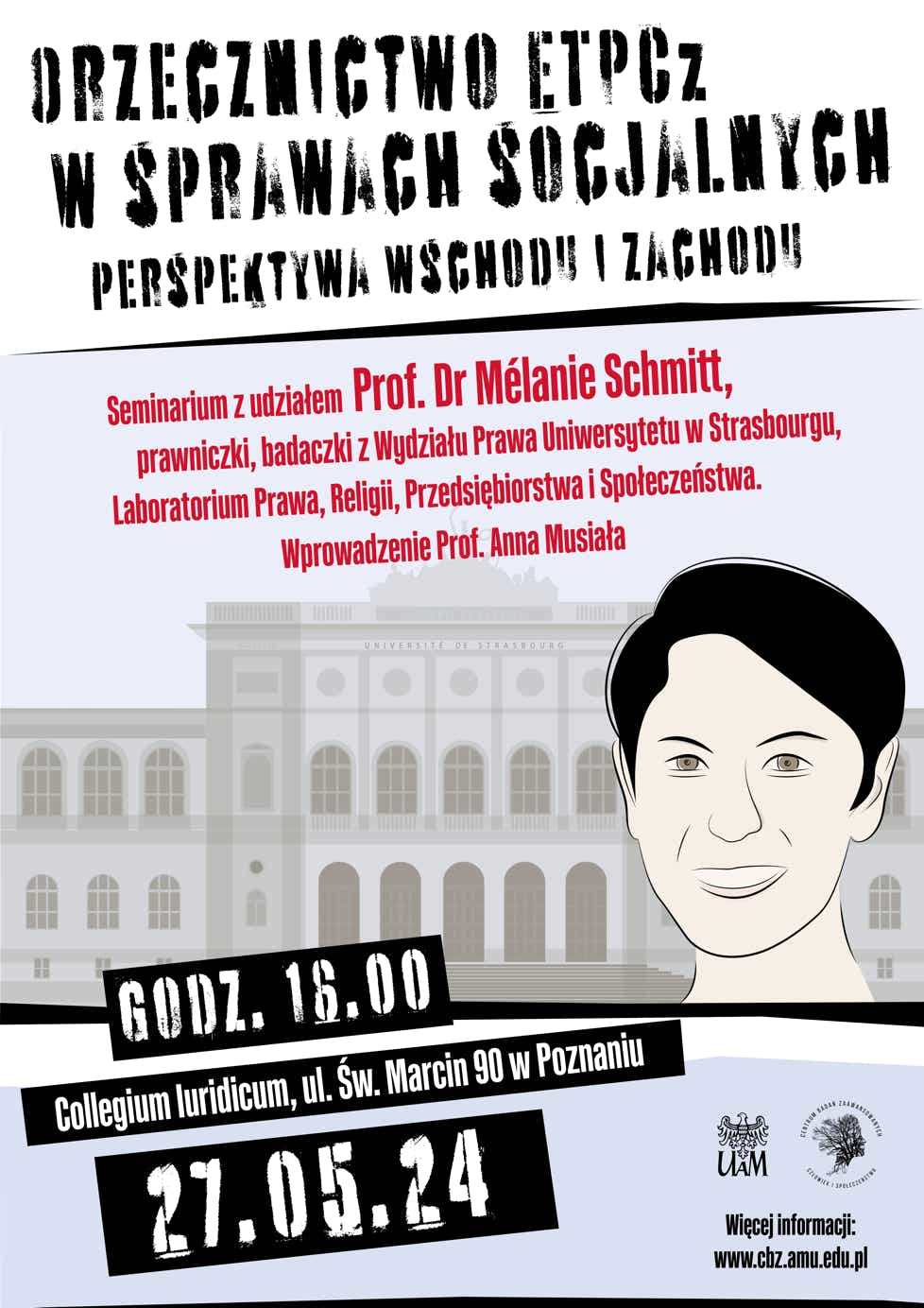
prof. Mélanie Schmitt
Las últimas publicaciones del Profesor José Eduardo López Ahumada se concentran en los derechos digitales de los trabajadores. Es autor de dos extensas monografías que son el resultado del trabajo de un equipo de investigación que dirigió en los últimos años. Asimismo son las que nos servirán de inspiración durante la parte de la visita prevista para Cracovia.
CBZ, 5 de enero 2024 r.
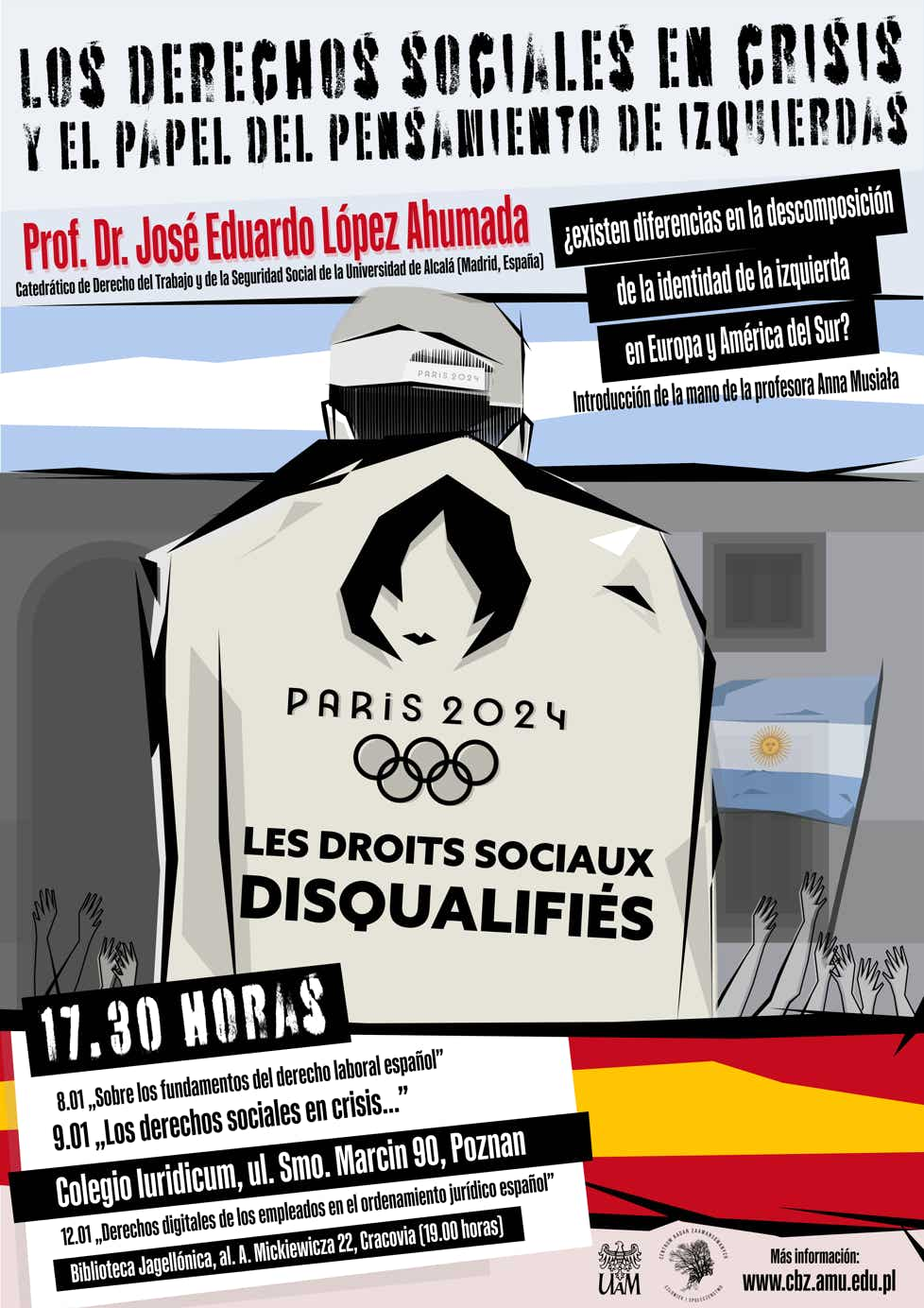
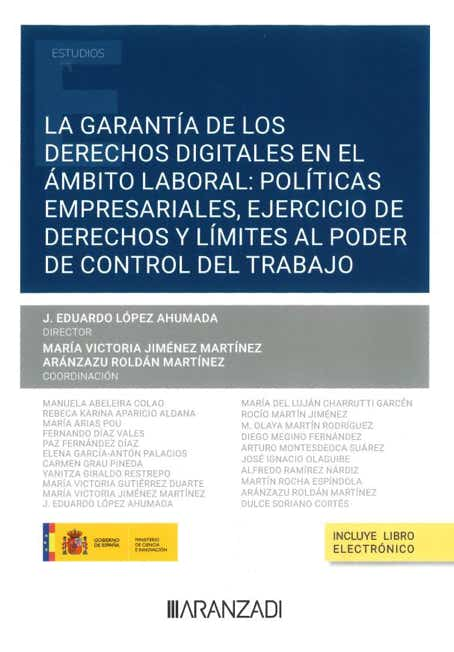
“Los derechos sociales en crisis
y el papel del pensamiento de izquierdas:
¿existen diferencias en la descomposición de la identidad
de la izquierda en Europa y América del Sur? “
Prof. Dr. José Eduardo López AHUMADA
Catedrático de Derecho del Trabajo y de la Seguridad Social
de la Universidad de Alcalá (Madrid)
Poznań, Collegium Iuridicum, sala 316
09.01.2024 a las 17.30 horas
El Profesor López Ahumada también impartirá dos conferencias más:
1) “Sobre los fundamentos del derecho laboral español” (08.01.2024 a las 17.30 horas, Poznań)
2) “Derechos digitales de los empleados en el ordenamiento jurídico español” (12.01.2024 a las 19.00, Cracovia)
Anna Musiała
CBZ, 4 de enero 2024 r.
* Por razones de organización les rogamos que nos escriban a la dirección musiala@amu.edu.pl avisando de su interés en asistir a la ponencia antes del día 10.01.2024.

Encuentro
con el Profesor Andrzej Szahaj
en el que reflexionamos sobre la “Democracia / Democracia en una empresa”
a la luz de dos monografías: Andrzej Szahaj El capitalismo del agotamiento y Jacques Rancière El odio a la democracia
IEA, 2 de noviembre de 2023, a las 18h00
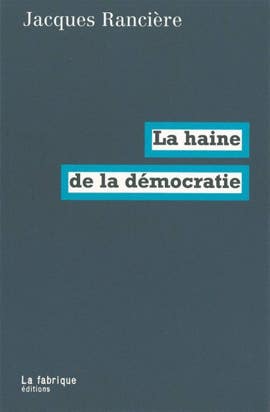
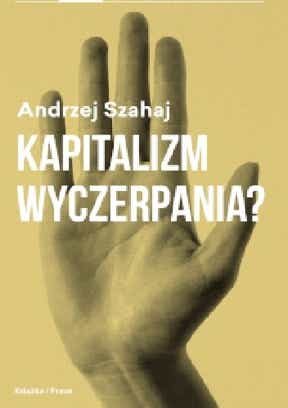
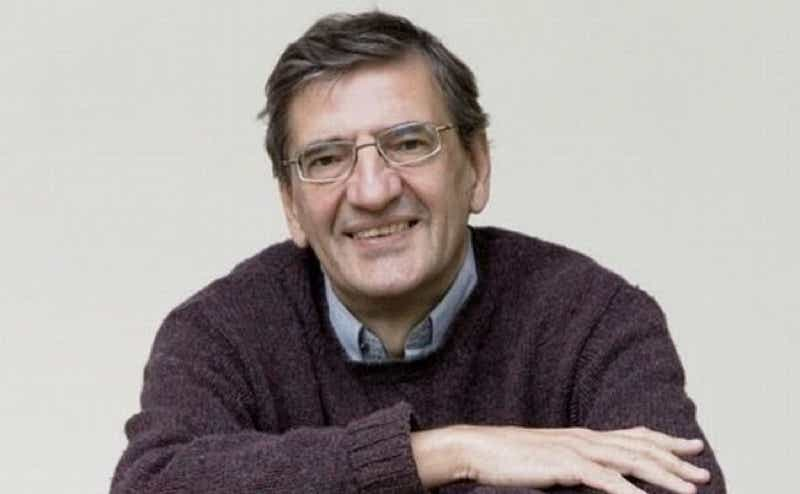
prof. Andrzej Szahaj
Segunda parte
del muy esperado encuentro con
David OST,
autor del libro Solidarity and the politics of anti-politics.
Me gustaría agradecer de corazón a David Ost
por su apasionante ponencia.
Asimismo, les doy las gracias
a la Profesora Małgorzata Jacyno,
a la Profesora Monika Kostera y
a Jarema Piekutowski
por sus valiosísimas aportaciones,
por la organización del evento y su excelente participación.
Anna Musiała
IEA, 11 de octubre de 2023
Ponencia
a cargo de la Profesora Nicole Maggi-Germain
La participación de la organización internacional del trabajo
en la construcción de un orden laboral mundial
IEA, 16 de octubre de 2023
(aula 4.07, Collegium Iuridicum Novum, Poznań, a las 13h15)
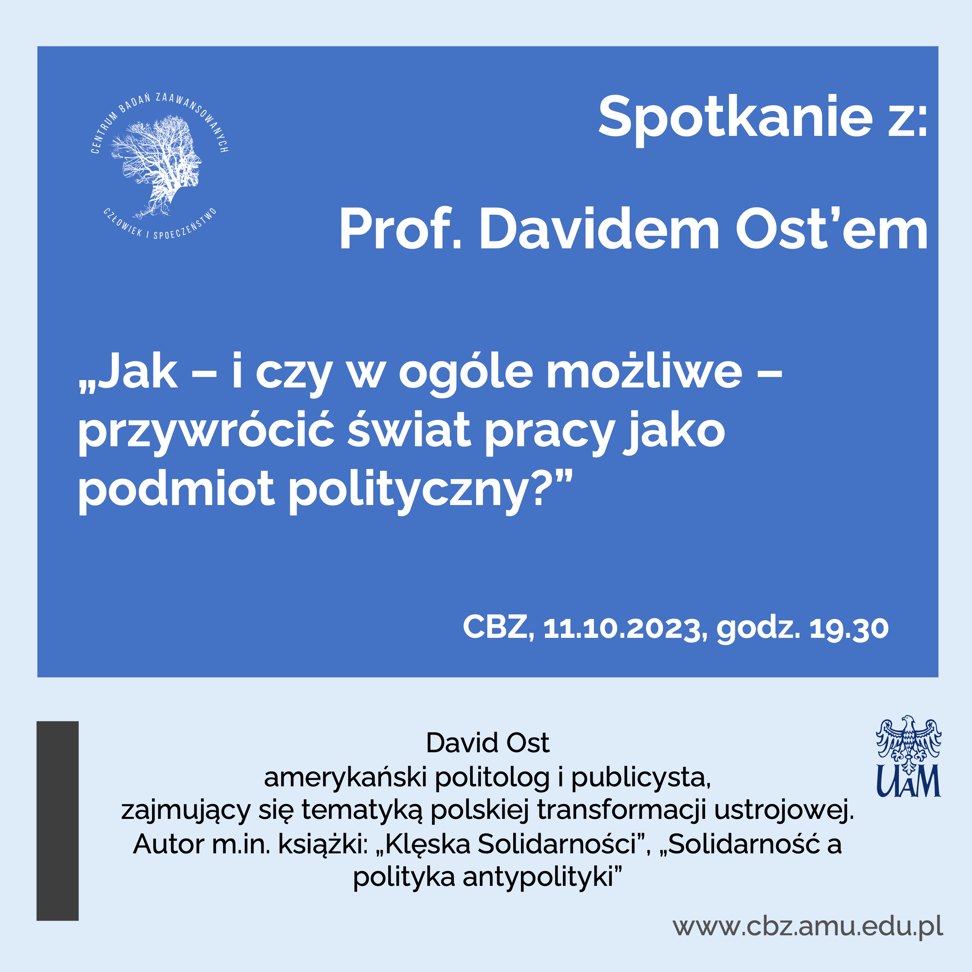
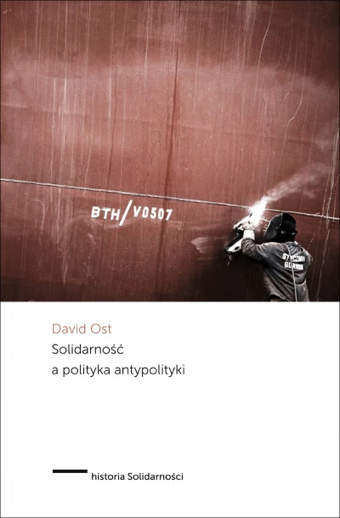
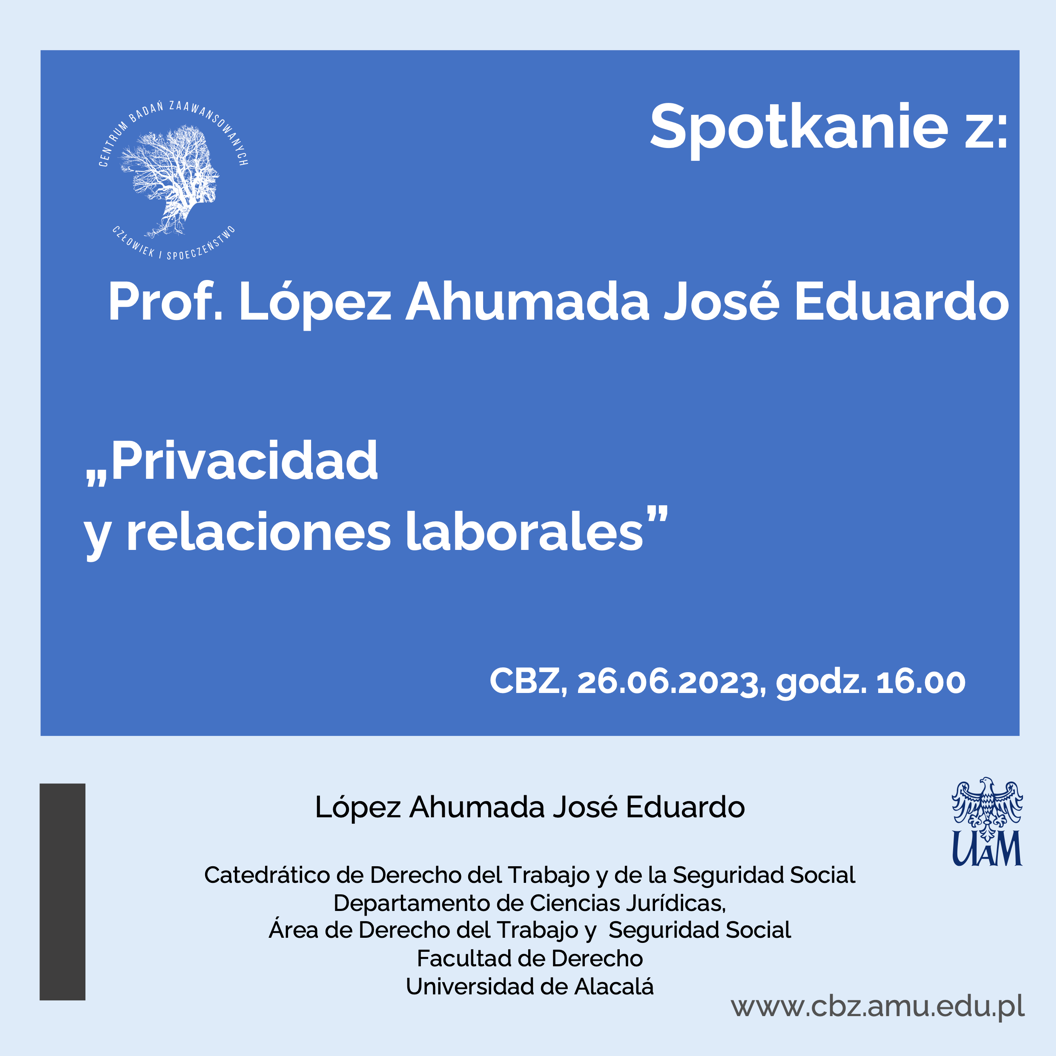

prof. López Ahumada José Eduardo
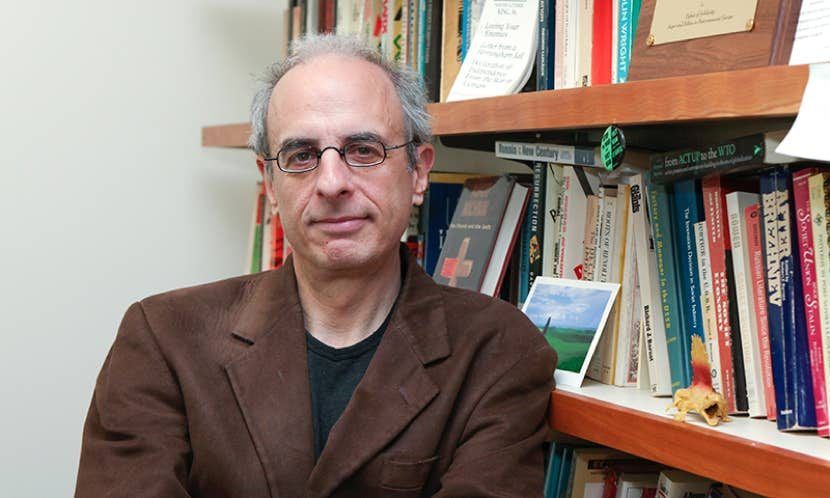
prof. David OST
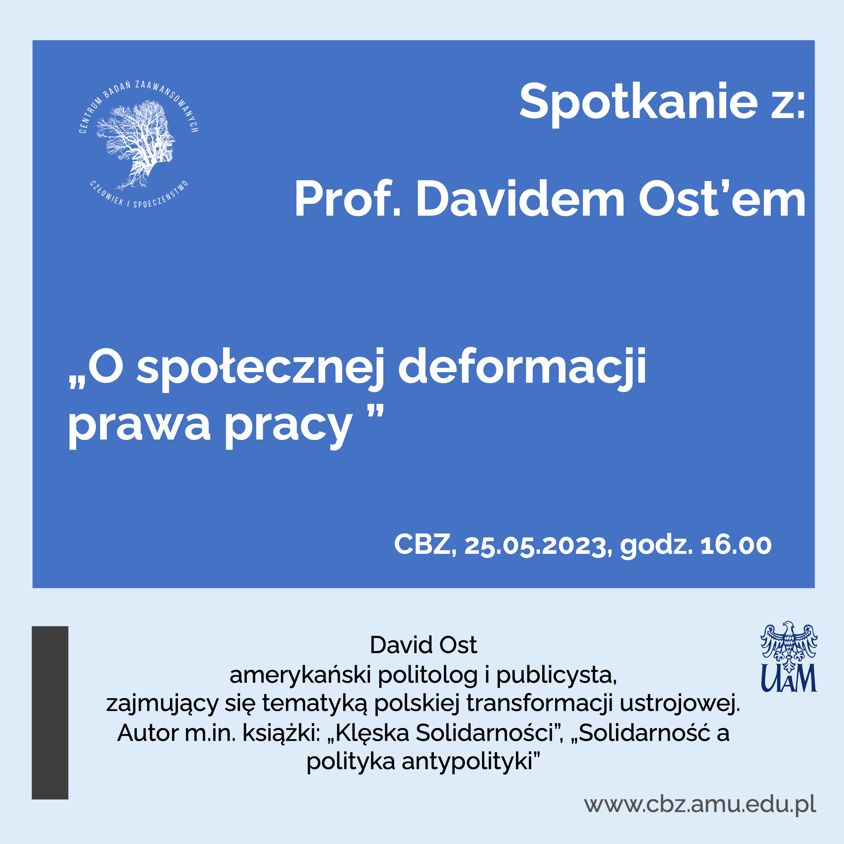
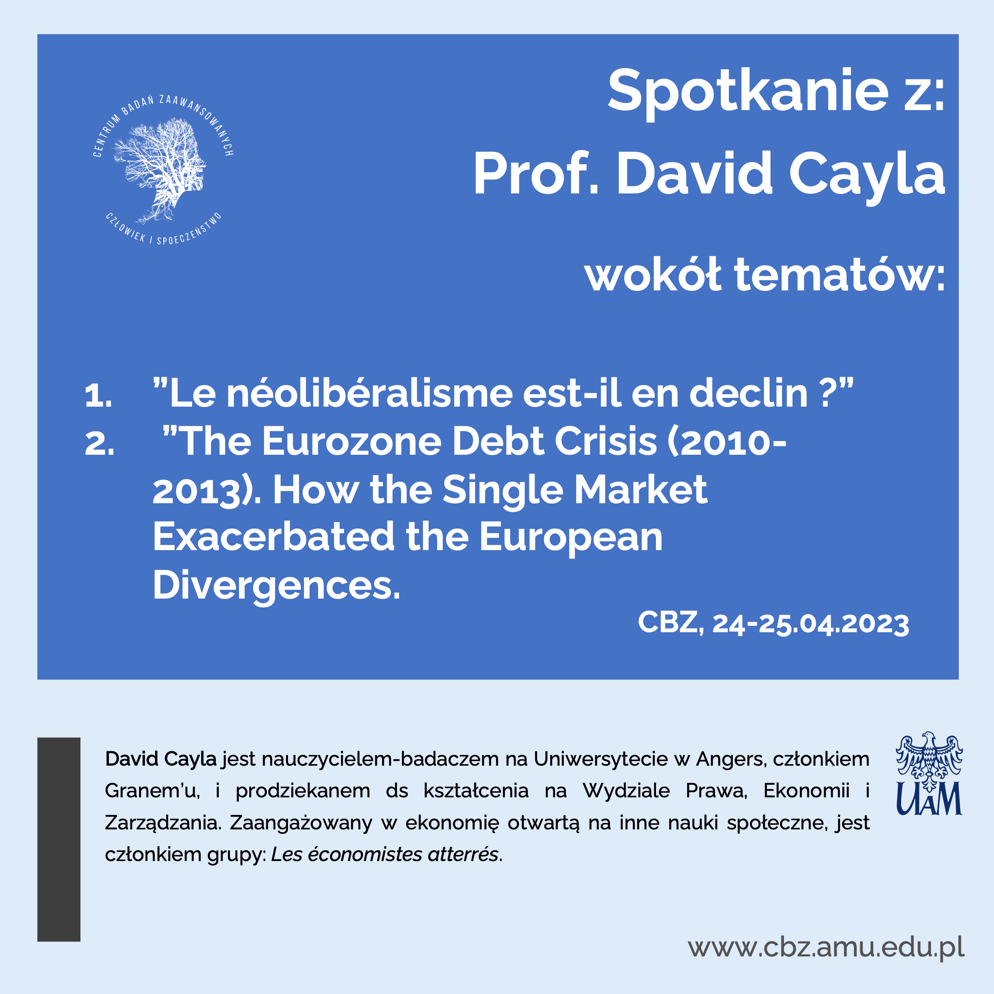
Hoy los participantes de mis seminarios y yo hemos tenido el placer de reunirnos con el profesor David Ost para comentar la deformación social del Derecho del Trabajo en Polonia. Profesor, le damos las gracias por este fantástico encuentro, estamos muy ilusionados con volver a verlo después de las vacaciones.
Anna Musiała
IEA, 25 de mayo de 2023
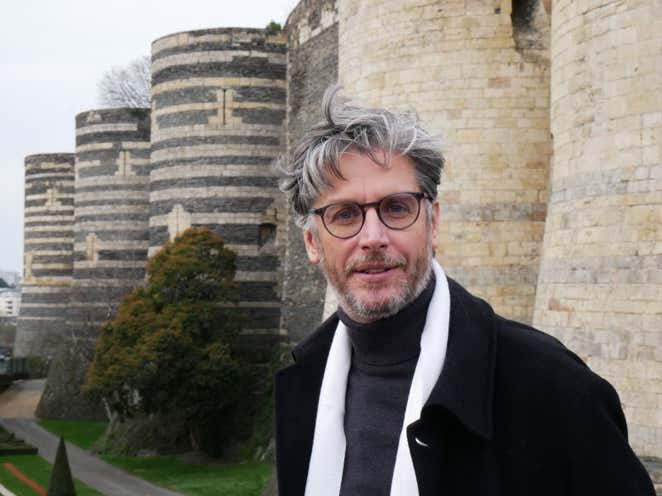
prof. David Cayla
Conférence 1: Le néolibéralisme est-il en déclin?
(24.04, godz. 16.45, Collegium Iridicum Novum, Poznań, al. Niepodległości 50, s. 2.3, tłum. na polski)
David Cayla
Economiste, chercheur au GRANEM, Université d’Angers
Depuis l’effondrement du système de Bretton Woods au début des années 1970, la plupart des pays du monde, parfois poussés par les institutions internationales, ont engagé des politiques inspirées de la doctrine néolibérale, fondée sur l’idée d’organiser le système productif, et plus globalement la société, sur le principe des prix de marché. En cela ils rompaient avec le régime de régulation des prix des biens de production qui s’était imposé au moment de l’après-guerre.
La crise financière de 2008 a cependant bouleversé les politiques économiques et monétaires. Devenues des acteurs majeurs de nouvelles de régulation à travers les politiques de «quantitative easing», les banques centrales sont intervenues massivement sur les marchés financiers et en soutien à la dépense publique. Ce retour d’une forme de régulation étatique au sein de la sphère financière marque-t-il le déclin de la doctrine néolibérale? La résurgence de l’inflation est-elle le signe d’une perte de contrôle? Ce qui est certain, c’est qu’un changement de pratiques est en train d’émerger et que les désordres croissants de l’économie mondiale et les impératifs environnementaux imposent de repenser plus globalement le rôle économique de l’État.
Conférence 2: The Eurozone Debt Crisis (2010-2013) How the Single Market Exacerbated the European Divergences
(25.04, godz. 16.00, Collegium Iridicum Novum, Poznań, al. Niepodległości 50, s. 0.1)
David Cayla
Economist, GRANEM research center, University of Angers
The real causes of the euro crisis (2010-2013) are still questioned. For the European authorities, it was mostly due to the imperfection of national institutions of the affected countries. In response, they recommend policies focused on the correction of these imperfections by demanding reforms in a move towards a balanced budget and improved competitiveness.
This presentation aims to point out the role of the Single Market in the intra-eurozone divergence process that lead to the debt crisis of the peripheral countries. We found that the Single Market has strengthened the agglomeration mechanisms (Krugman 1991), which explains the geographical industrial polarization of Europe. Although this dynamic has been beneficial for the core European countries, it accelerated the deindustrialization of southern economies. Moreover, the policies pursued since 2010 have failed to correct the economic imbalances. It then appears that only a profound reconsideration of the rules that organize the functioning of the Single Market would be likely to stop the current divergence dynamics of European economies.
Rafał JAKUBOWICZ: Rafał JAKUBOWICZ: nació en Poznań (Polonia) en 1974. Se graduó por la Academia de Bellas Artes de Poznań (Facultad de Educación Artística y Facultad de Pintura, Grabado y Escultura) y por la Universidad Adam Mickiewicz de Poznań (Facultad de Lenguas Modernas, especialidad: filología hebrea). Miembro del Sindicato Nacional “Iniciativa Laboral”.
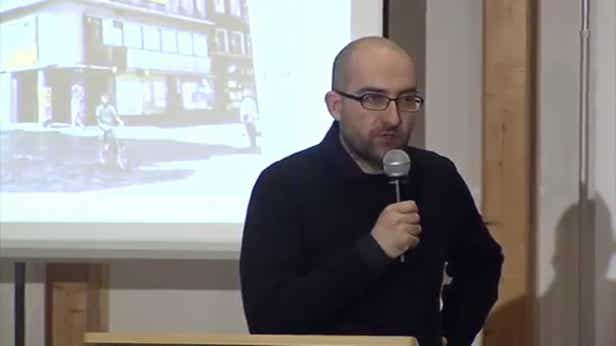
Ukazała się książka:
“Le travail n’est pas une marchandise”/
“Praca nie jest towarem”
autorstwa prof. Alain Supiot,
w tłumaczeniu na język polski.
Jest to zarazem pierwsza publikacja CBZ.
CBZ, 2 stycznia 2023
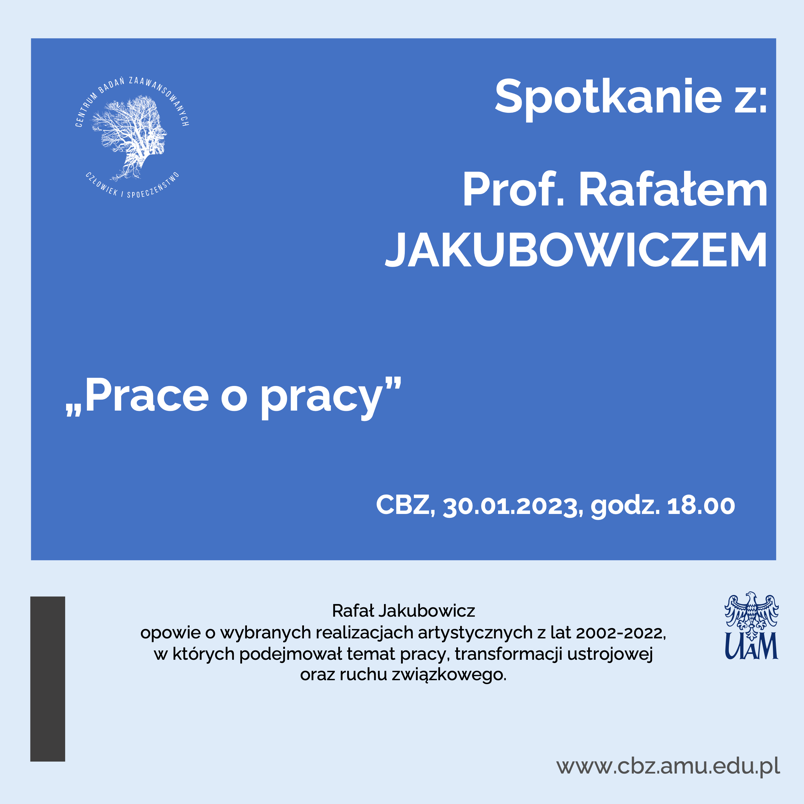
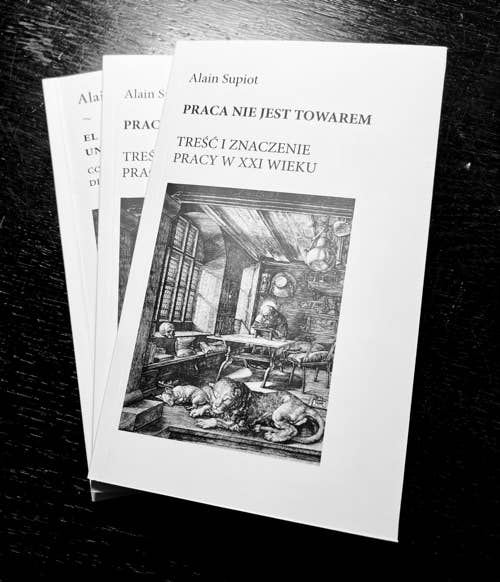
Áreas de interés del Profesor Rafała JAKUBOWICZ: precariado, trabajo inmaterial, reproductivo, biopolítico; marxismo autonomista (operaísmo y postoperaísmo); sindicalismo; explotación y prácticas de resistencia en zonas económicas especiales; costos sociales de la transformación (de la terapia de choque) en Polonia y Europa del Este; desempleo y racismo de clase; política habitacional antisocial (llamada “restitución de propiedades” y “despojo de inmuebles”), guetos de pobreza y gestión penal de la pobreza; nueva lucha de clases; gentrificación (teniendo en cuenta el papel de los artistas en dicho proceso); artista como trabajador; fábricas educativas ante la política neoliberal de rentabilidad; apropiación de la memoria en el ámbito de las políticas históricas; gentrificación de la memoria; maneras de procesar la memoria traumática en el arte contemporáneo; discurso del Holocausto en la cultura y la política de Israel; lengua hebrea en las obras de artistas visuales, conceptuales y postconceptuales de Israel. Más información en: http://www.jakubowicz.art.pl
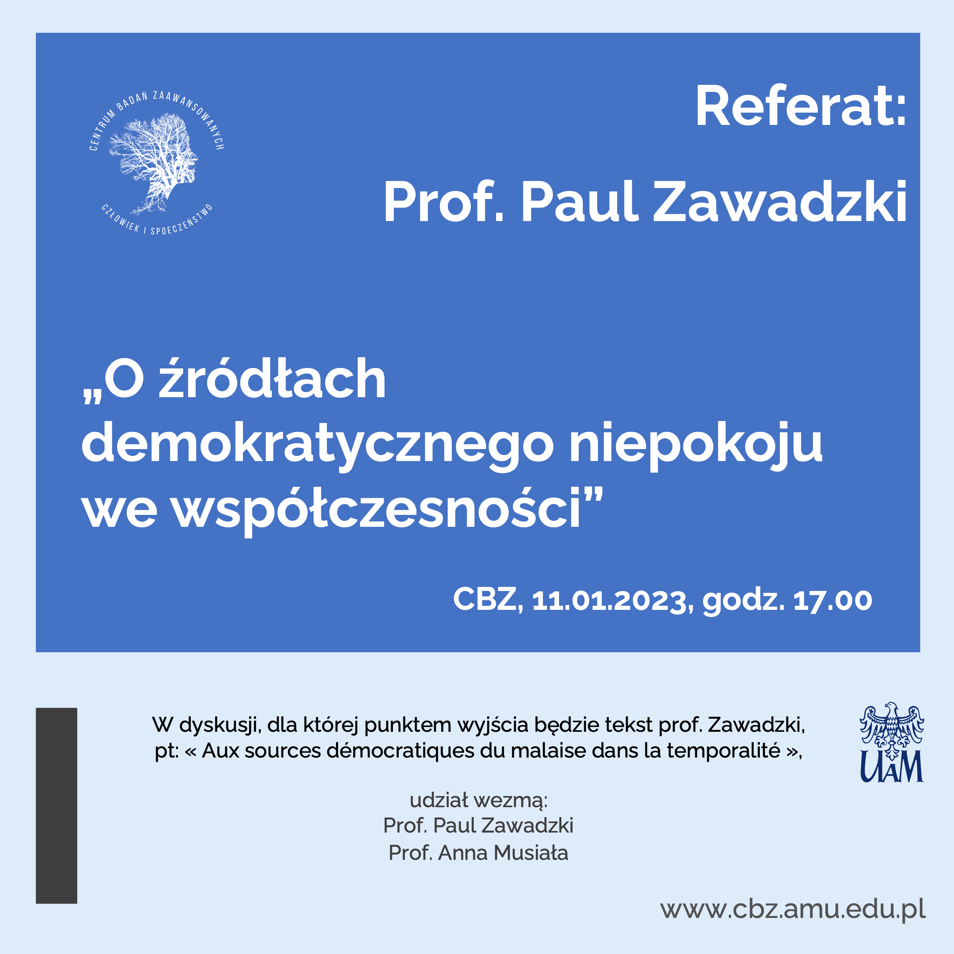
«Aux sources démocratiques du malaise dans la temporalité»,
Temporalités, n°30/2020

Prof. Paul Zawadzki wykłada filozofię polityczną i nauki społeczne na wydziale nauk politycznych Uniwersytetu Paryskiego 1 Panthéon-Sorbonne. Jest związany z laboratorium GSRL (Groupe Sociétés Religions Laicités) de l'Ecole Pratique des Hautes études, jest także członkiem l'Institut européen Emmanuel Levinas (IIEL).
La reunión, titulada:
"Sobre la crisis del trabajo asalariado en el capitalismo tardío", es una continuación
de la discusión sobre el trabajo al final del capitalismo, empezada con la conversación
sobre el libro de
Wiesławiec Deluxe:
„Cada trabajo deshonra. Saludos desde el capitalismo tardío.”
Editorial Znak, 2022
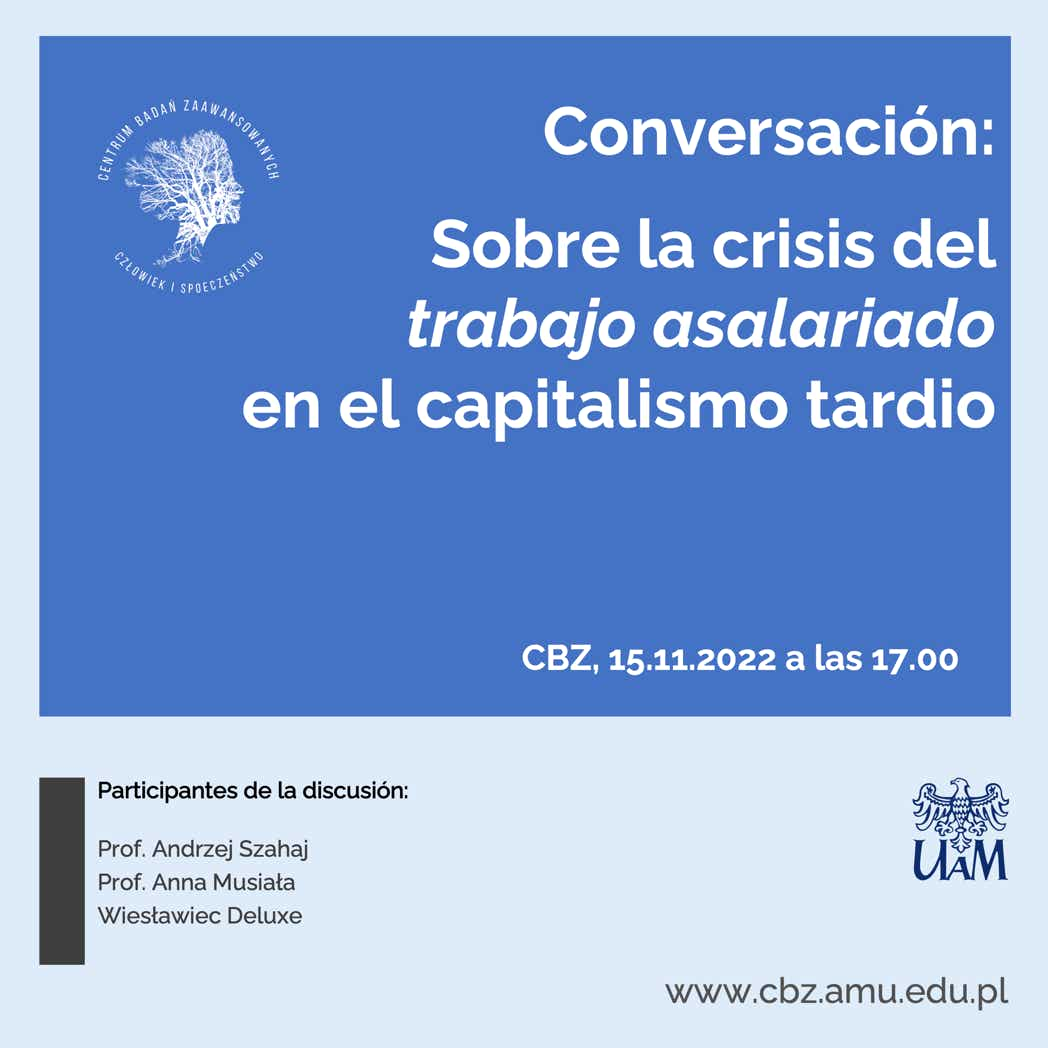
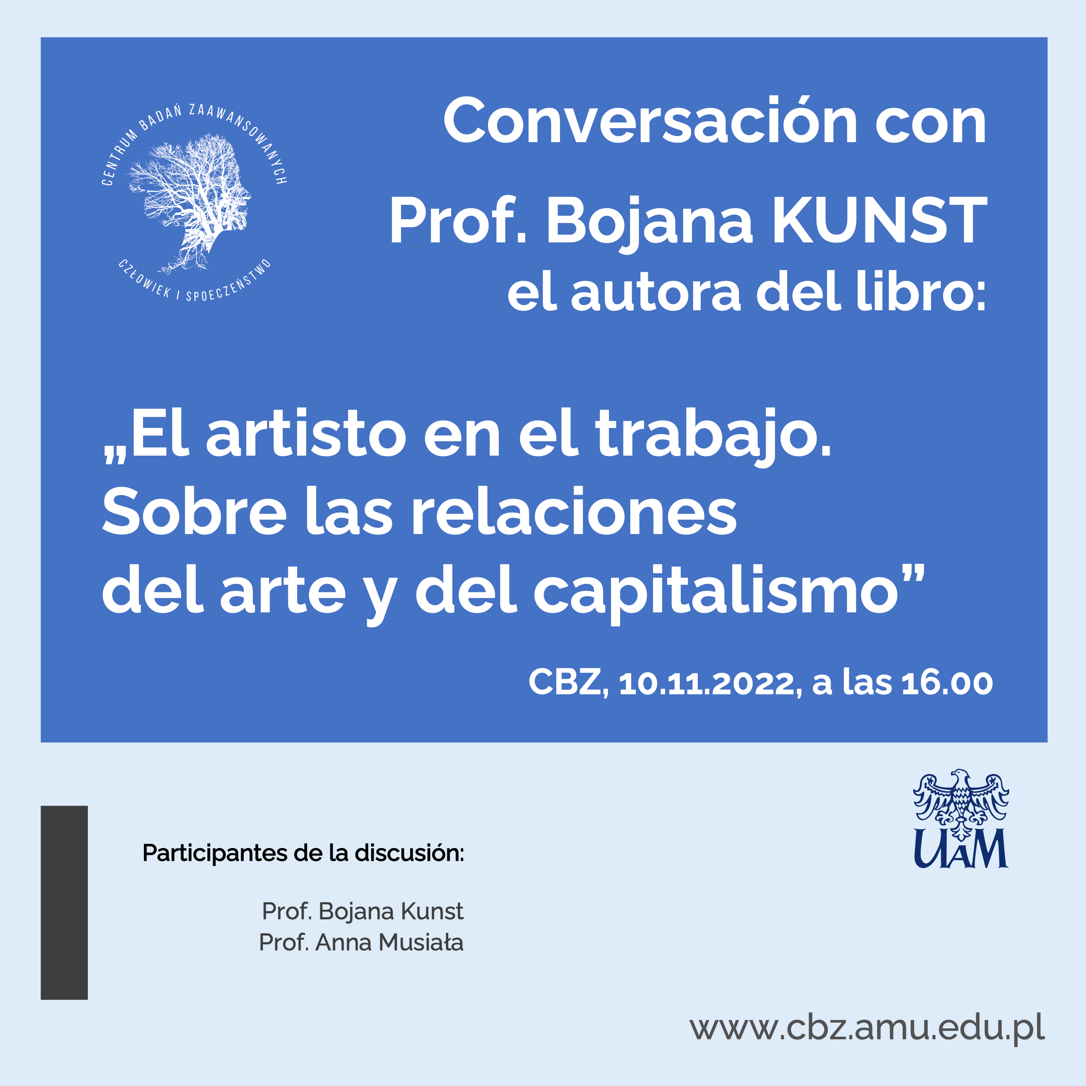
Prof. Dr. Bojana Kunst studied in Ljubljana, Slovenia, and is a full professor at the Institute for Applied Theatre Studies / ATW – Institut für Angewandte Theaterwissenschaft, Justus-Liebig University Giessen.
She is the author of the book: “Artist at work. Proximity of art and capitalism”, Washington USA 2014.
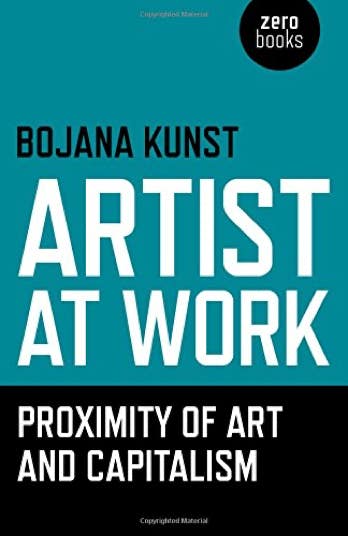
“Artist at work. Proximity of art and capitalism”.
“Artistic work is the focus of my interest because it allows us to analyse some important characteristics of the development of contemporary art in the last few decades and especially the changes in the forms of artistic autonomy that appeared with the increasing closeness of art and life. The aim of my book is therefore to note that these changes are closely connected to the changes in contemporary capitalism and the entry of post-Fordist ways of production into the centre of contemporary production.” (p. 18).
“Old forms of life become obsolete even before they can actually be absorbed. This opens up the way for subjectivity, which experiences its transformation through constant existential paradoxes. This makes us live in a constant state of tension, at the edge of anxiety; it is this state that causes an increase in our investments.” (p. 21-22). “(…) In this context, I see radical consumption as the consumption of the body, presence, human actions and abilities, physical strength, spiritual power and effects; it aims to intervene into the intersubjective and productive nature of subjectivity and, in this way, also open up the relationship between performers and spectators.” (p. 22).
“The problem is therefore that in today’s capitalism, we work in the manner that Abramović calls performance mode. One’s work is intertwined with the performing and the maintenance of creativity; in this, one should ignore every disturbance from the environment or political context, as well as any antagonist disturbance that comes from the sphere of the public. (…) This loss of voice is also quite close to the contemporary ways of working; those can also be revolutionary works without a political voice, with art and the contemporary creative work closely resembling each other in this aspect.” (p. 42-43).
“But what happens with capitalists who donate their wealth to art and receive tickets to the performances art pieces of the rich, in which they not only participate, but are also critically addressed? Their pleasure lies in the critical attitude towards them; it is in the co-existence of their status as the rich and a parodic critique of their role.” (p. 47).
“Today, these social relations are at the core of generating value, with manners of production connected to the exploitation of these relations. At the same time, the dematerialization of objects and the fetishisation of open procedures and transparent relations are at the core of post-Fordist shifts in the understanding of work and production.” (p. 59).
“The museum is still a space for production, a space for exploitation; in the <<museum as a factory>>, things are still produced.” (p. 63).
“It is also non coincidence that many venues intended for the contemporary artistic events actually inhabit former Fordist factories that there were deserted after the relocation of Fordist production to non-Western countries.” (p. 64).
“Let us ask ourselves, where this accurate description of the highly ambitious performance artist actually comes form. Is this not the description of the contemporary worker, equipped for continuous high performance? That of the always critical and active labourer, whose subjectivity in entirely subjected to the modes of contemporary capitalist production?” (p. 80).
“What, then, is the community? Paradoxically, it is the constant dispossession of collaboration and its possibilities.” (p. 96)
“(…) the communities are much more coincidental and flexible and are not connected to a certain space; they are actually not united by work, but over the very specific temporal dimension of meeting.” (p. 97).
“This intriguing connection between work and future underlines the excessive use of the world “project” in the contemporary artistic and creative professions; it is linked with a specific time dimension of work and creation, which I will term “projective temporality”. (p. 157).
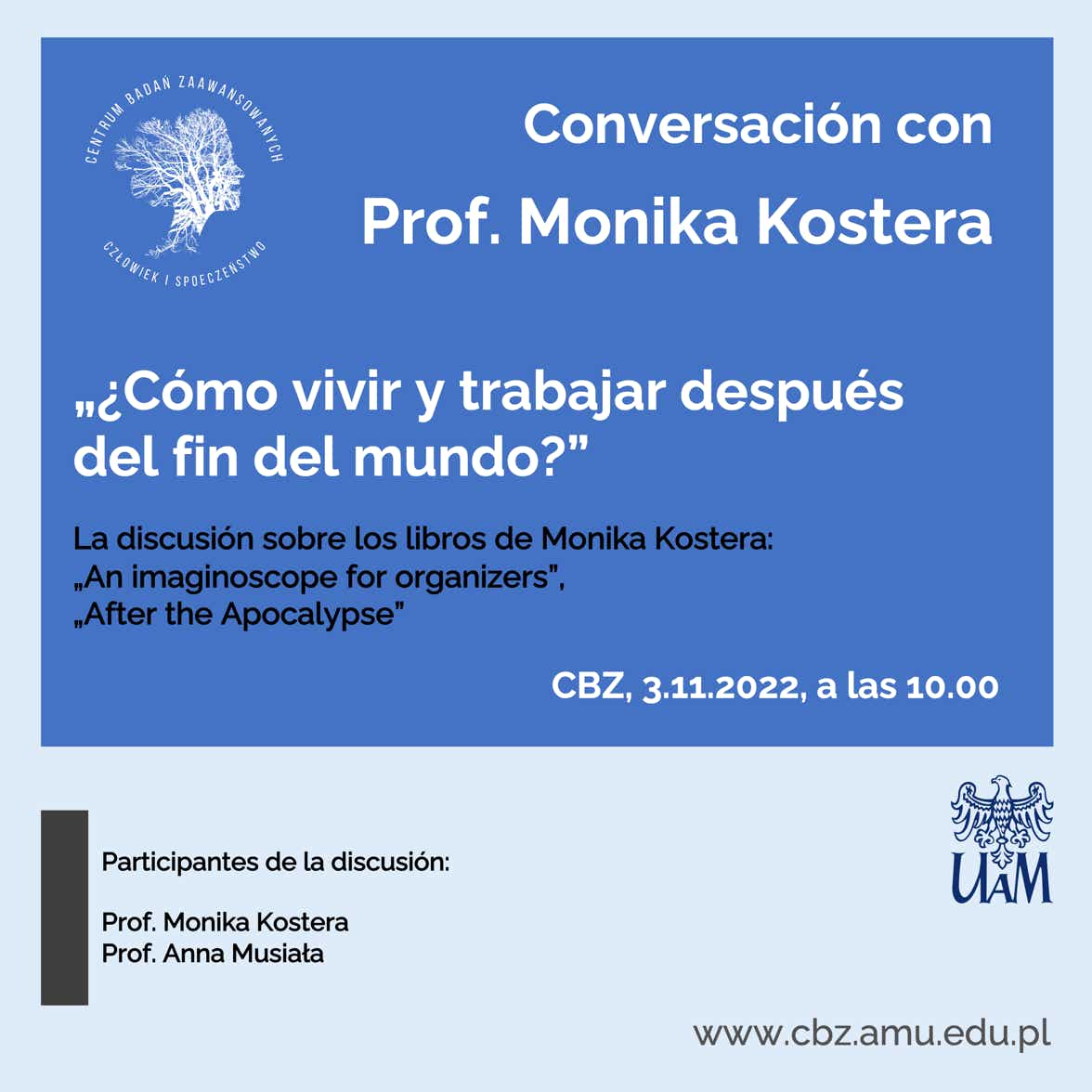
Monika Maria Kostera (nacida el 28 de febrero de 1963 en Varsovia - socióloga polaca, profesora titular de ciencias económicas (2004) y humanidades (2017), profesora titular de la Universidad de Varsovia. Profesora de la Universidad de Södertörn en Suecia y de la Escuela de Negocios Institut Mines Telefon (Université Paris Saclay en Francia).
“An imaginoscope for organisers. Liminal stories for liminal times”, Washington USA 2021.
„Big social structures are dissipating and the social-economic system that embraces all the important institutions and organizations is dysfunctional. Yet there is no new working system on the horizon. (p. 2).
Neoliberalism is capitalism that has lost its memory: it is a system suffering from dementia. It is unable to learn and lacks imagination. This – at a time when we need alternatives more than ever to leave the void of the interregnum collectively and construct a new system that would be more human and ecologically sound than the former one. (p. 5).
Biology professor David Sloan Wilson (2021) expressed a strong conviction of the urgent need for stories that would reflect the human condition better than the ego- and individual-centred ones that now dominate in the public course. (p. 11). (…) But can we? How would this be possible in a tremendous crisis of imagination? (p. 11-12).
The imaginoscope is a device used to observe and experience objects and events taking place in the imagination. It is made entirely of imaginary matter. (p. 12).
The researcher is like a traveller betwixt and between known worlds, attentive and curious about everything, refraining from categorizations judgement, a light of pure consciousness immersed in the surroundings yet not quite there at all, devoid of a normal role and thus almost socially invisible. (p. 19-20).
However, we are so rarely listened to; we listen so rarely. (p. 40).
We are not able to understand management without understanding art. It is impossible to understand economic development without an aesthetic perspective (p. 114-115). (…) Social constructs, such as the market, organizing and management are all related to morality and aesthetics. (p. 115).
Our times tend to keep at hand a set of ready rapid, automatic categories for everything, which usually come in stark binary oppositions. It is always either this or the other, never and – and. Whenever a third alternatives appears and acquires a transitory status is swiftly re-categorized into one of the originals. (p. 145).
“After the Apocalypse. Finding hope in organising”, Washington USA, 2019.
We live increasingly in a world where we do not feel safe, or even at home, yet so many of us seem to think this is all that there is. As in Margaret Thatcher’s famous declaration: there is no alternative. And this is exactly what is the most dangerous of today’s many perilous tendencies. We need alternatives more than ever, and not just any alternatives but ones which give us resilient, sustainable and meaningful ways out of the interregnum and into a future worth living in. (p. 7).
The employee is a cultural construct which can be understood in a historical context, a social role central for the development of the industrial society, organized around several discipling institutions such as depersonalization of relationships, quantification as replacement for trust and reductionist rationalization. These institutions have been normalized and appear “normal” or even “inevitable” but they are neither of these things. (p. 118).
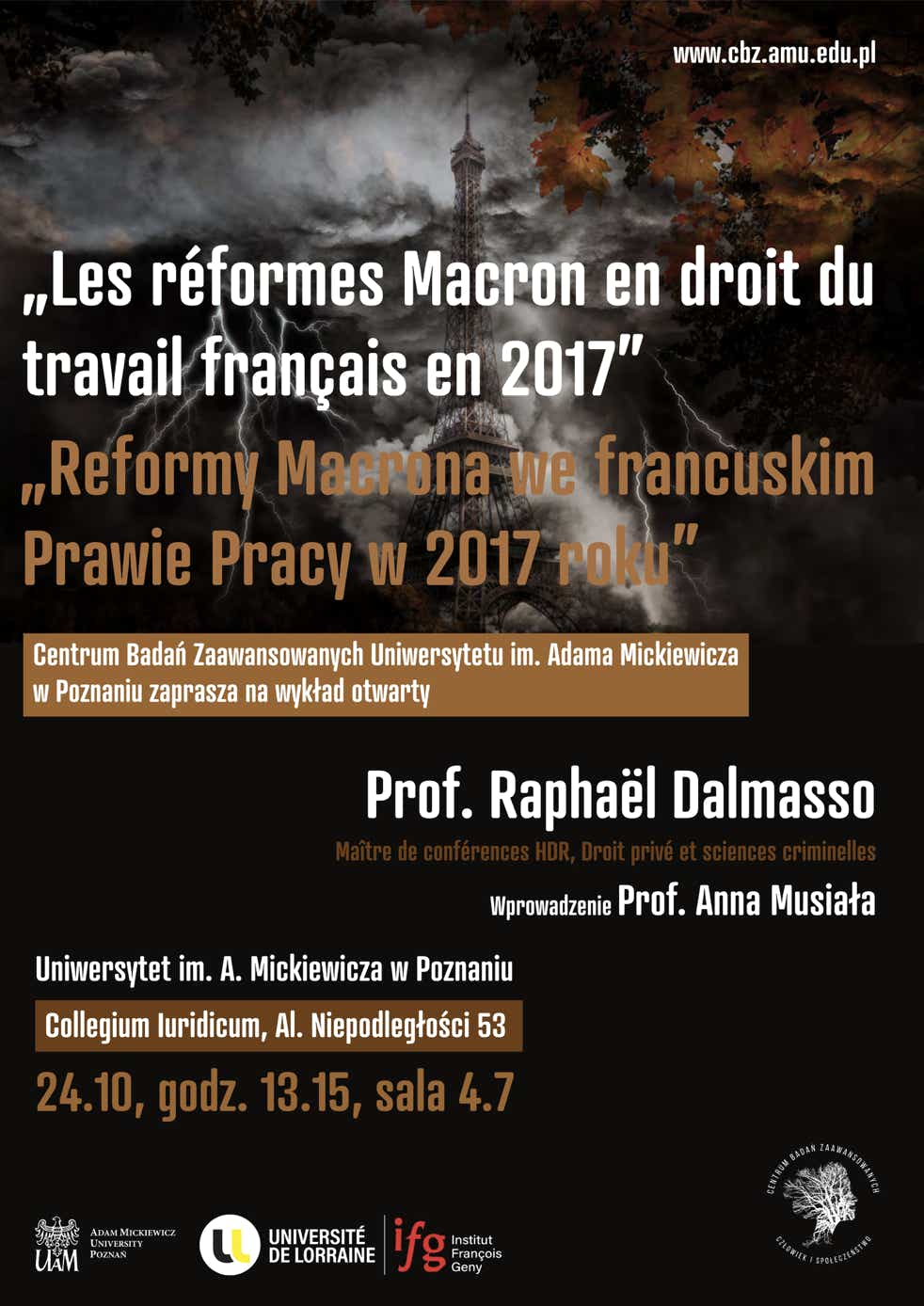

Profesor Raphaël Dalmasso,
profesor Uniwersytetu de Lorraine, we Francji.
Wiesławiec Deluxe, nacido en 1985. Graduado en relaciones internacionales y sociología en la Universidad Jagielloński de Cracovia. Exprofesor académico y becario del DAAD en el Archivo Vilem Flusser de la Universidad de las Artes de Berlín, desde 2013 empleado en varias corporaciones. Autor de fan page, columnas publicadas en Ha! Arcie y la revista Going.More, autor del libro „Cada trabajo deshonra. Saludos desde el capitalismo tardío.”, publicado por la editorial Znak en 2022.
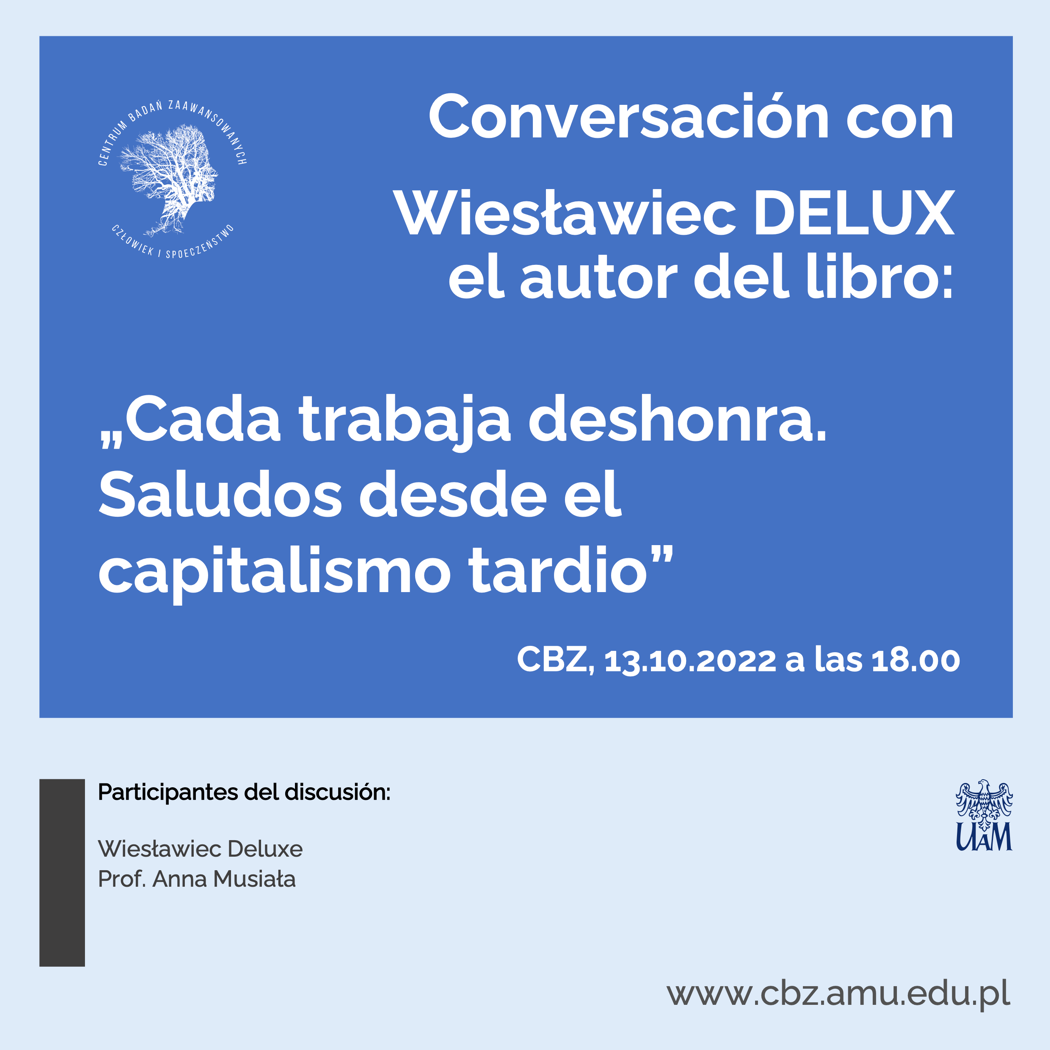
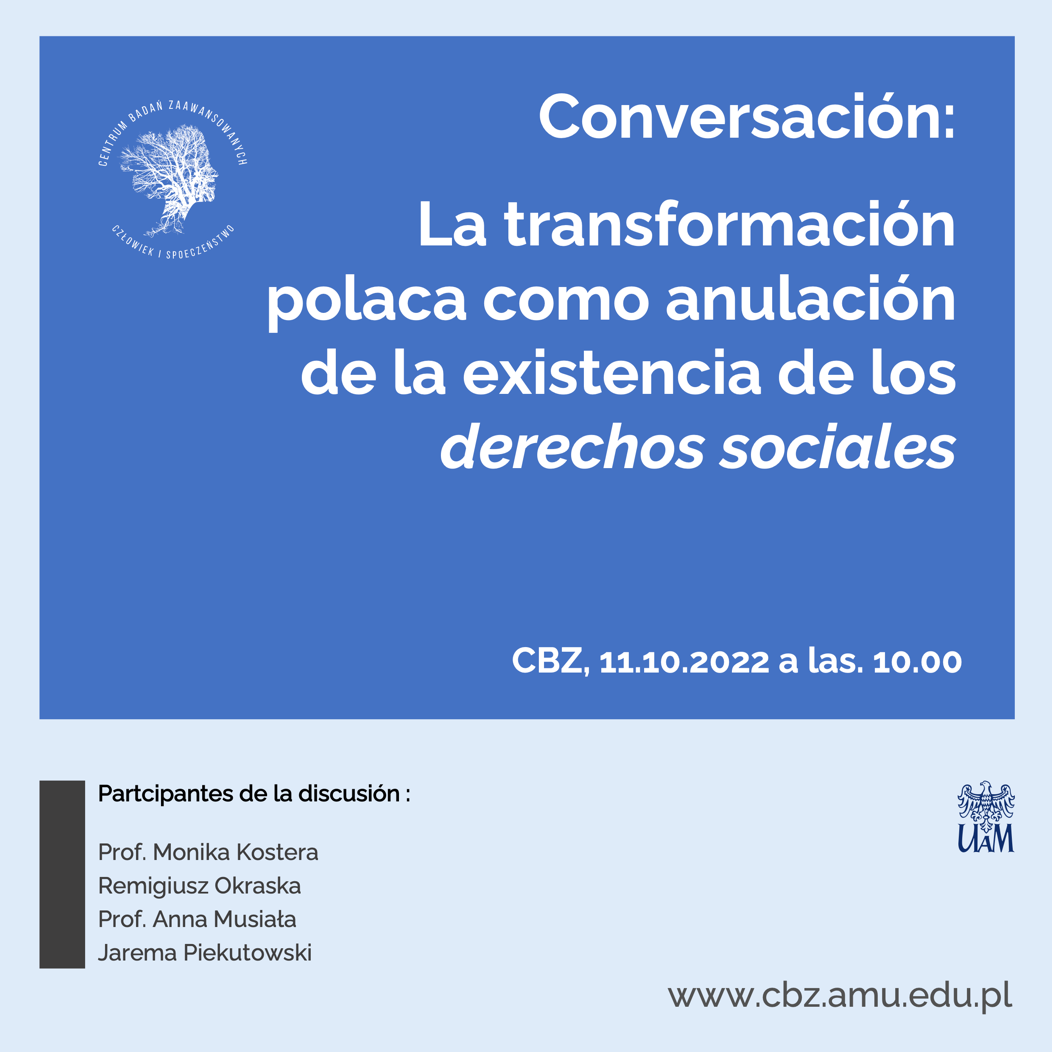
Hoy tuvimos una gran oportunidad de hablar sobre los efectos de la transformación en términos de comprensión de los derechos sociales y, de facto, del derecho laboral, sobre el sentido de volver a este - para muchos - trauma como no trabajado, sobre la sociedad polaca y las clases que entonces desaparecieron, teniendo un impacto tan grande en el mundo laboral moderno.
Por esta maravillosa conversación: a Monika Kostera y a Remigiusz Okraska y a Jarem Piekutowski,
Muchas gracias.
Anna Musiała
CBZ, 11 de octubre 2022.
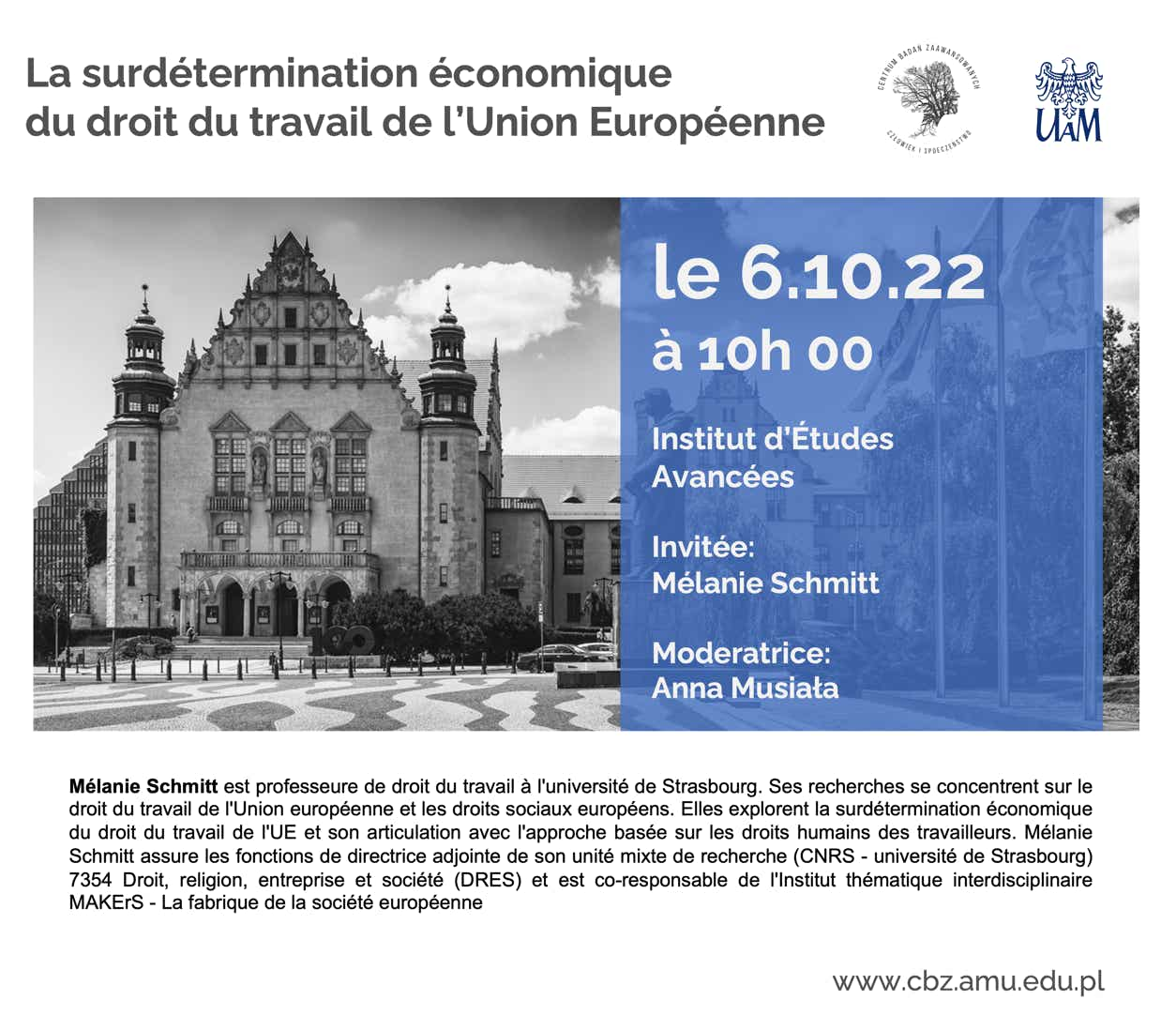
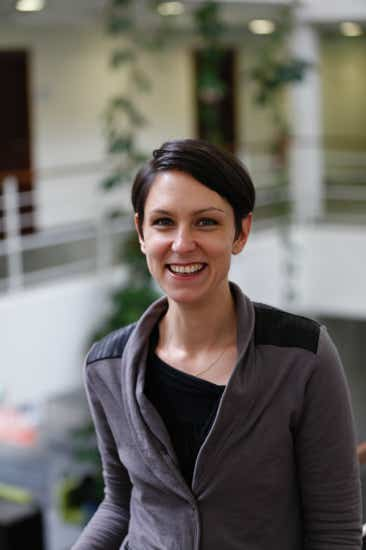
prof. Mélanie Schmitt
Conférence à l’Institut d’études avancées de l’Université de Poznan – 6 octobre 2022, 10h 00
La surdétermination économique du droit du travail de l’Union européenne
L’objet de la conférence est de questionner l’inscription du droit du travail dans le projet fondamentalement économique qu’est l’Union européenne, en vue de révéler les finalités et les fonctions de cette branche du droit.
Notre réflexion est basée sur une présentation des trois ensembles normatifs qui sédimentent et composent le «système» actuel du droit du travail de l’UE: 1) le droit du travail du marché intérieur, centré sur les libertés de circulation; 2) le droit de l’harmonisation sociale, visant la protection des travailleurs; 3) le droit du marché du travail, concourant aux objectifs de croissance et d’emploi au sein de la coordination des politiques économiques des États membres de l’UE.
À partir de deux évolutions récentes primordiales, nous proposons d’analyser le déplacement des équilibres propres à chaque ensemble et de l’articulation entre ces trois ensembles. Nous tenterons d’en tirer les enseignements pour la construction juridique de l’Europe sociale.
La première évolution résulte de jurisprudence de la Cour de justice de l’Union européenne au sujet de la directive UE n°2018/957 sur le détachement des travailleurs. Dans deux arrêts importants du 8 décembre 2020 rendus à l’occasion de recours en annulation de cette directive formés par la Pologne et par la Hongrie , la Cour rejette les arguments des gouvernements polonais et hongrois fondés sur une vision économique des règles du détachement en matière de droit du travail, et procède à une réinterprétation sociale de ces règles en introduisant le concept inédit de «concurrence équitable» dans sa jurisprudence. Désormais, la rémunération des travailleurs ne peut plus valablement constituer un élément de concurrence entre les États membres, leurs entreprises et, in fine, leurs travailleurs.
La seconde évolution résulte quant à elle de l’adoption en 2017 du Socle européen des droits sociaux et sa mise en œuvre subséquente. Conçu pour renforcer la dimension sociale de l’Union économique et monétaire, ce texte peut être analysé comme un (nouveau) programme de développement la politique d’harmonisation sociale de l’UE. Le droit du travail de l’Union européenne en ressort encastré dans la politique économique, qui lui impose ses objectifs, ses méthodes et, plus largement, sa rationalité.
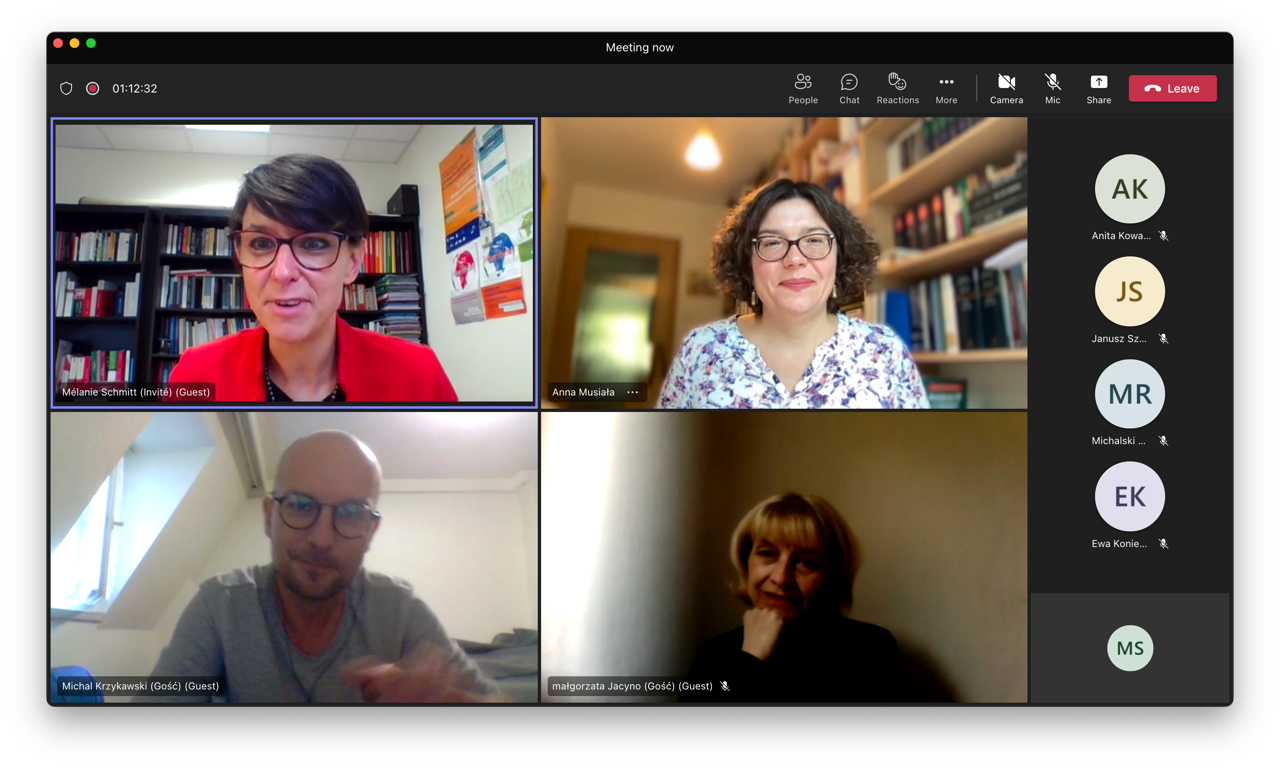
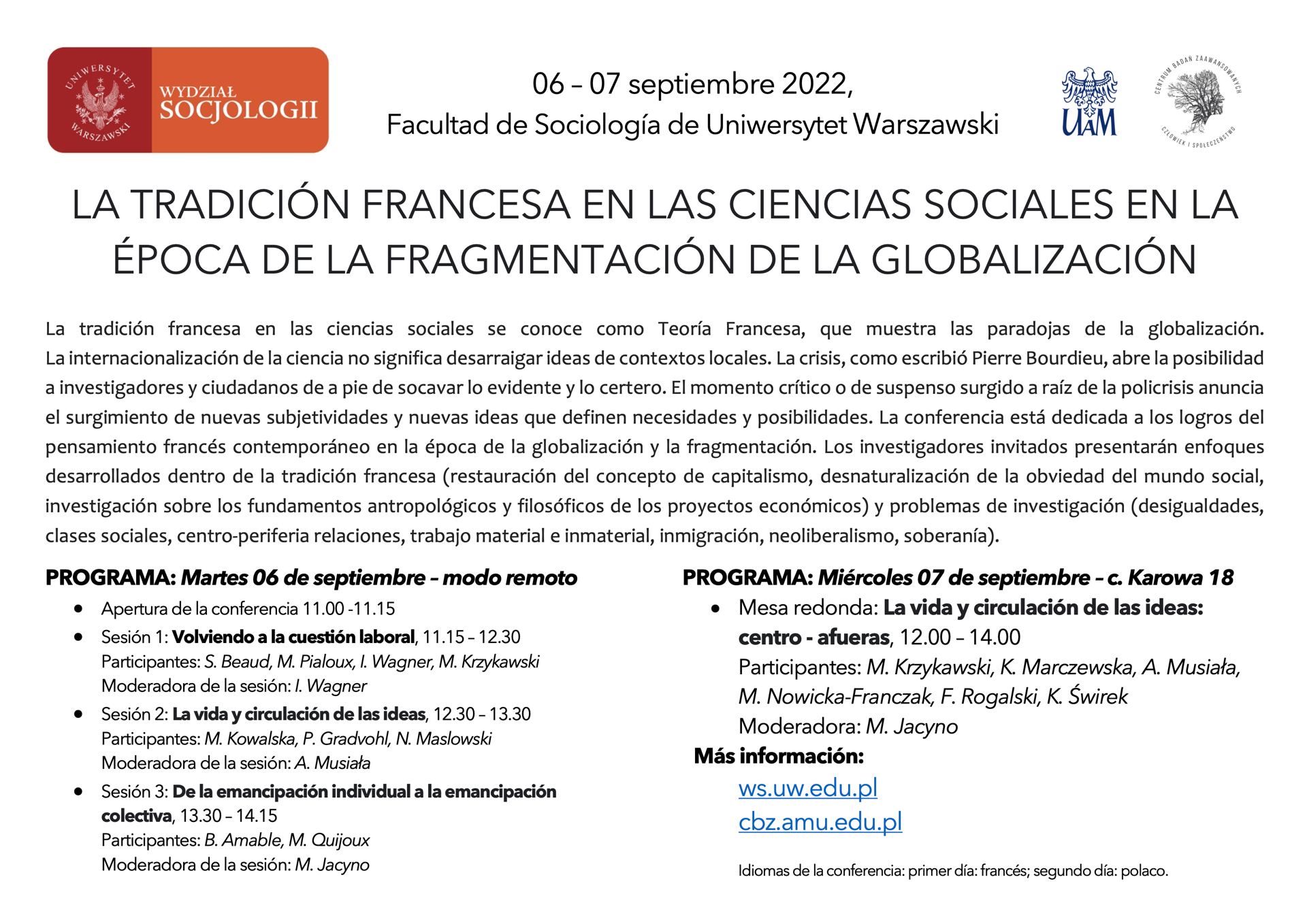
Więcej informacji:
Wydział Socjologii Uniwersytetu Warszawskiego
Uczestnicy konferencji:
Bruno Amable, Université de Genève, Département d’histoire, économie et société
Stéphane Beaud, Institut d'études politiques de Lille
Paul Gradvohl, Centre national de la recherche scientifique
Małgorzata Jacyno, Uniwersytet Warszawski, Wydział Socjologii
Małgorzata Kowalska, Uniwersytet w Białymstoku, Instytut Filozofii
Michał Krzykawski, Uniwersytet Śląski, Centrum Badań Krytycznych nad Technologiami
Katarzyna Marczewska, tłumaczka
Nicolas Maslowski, Uniwersytet Warszawski, Centre de civilisation française
Anna Musiała, Uniwersytet im. A. Mickiewicza w Poznaniu, Centrum Badań Zaawansowanych
Michel Pialoux, École des hautes études en sciences sociales, Centre de sociologie européenne,
Magdalena Nowicka-Franczak, Uniwersytet Łódzki, Wydział Ekonomiczno-Socjologiczny
Maxime Quijoux, Centre national de la recherche scientifique, Laboratoire interdisciplinaire pour la sociologie économique
Filip Rogalski, antropolog, tłumacz
Krzysztof Świrek, Uniwersytet Warszawski, Wydział Socjologii
Izabela Wagner, Collegium Civitas